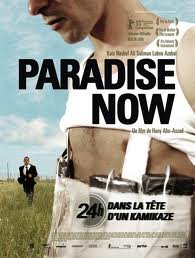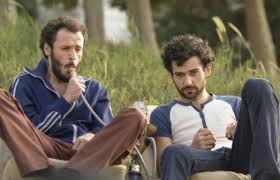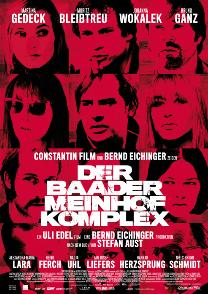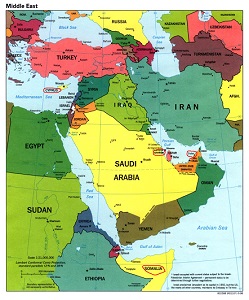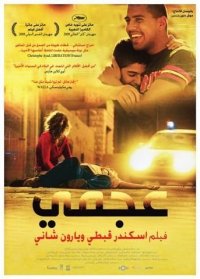 Ajami is a neighborhood on the south side of Tel Aviv, Israel’s largest metropolitan area; many Arabs reside there and there is a high crime rate involving drugs and violence. This movie mainly interweaves events depicted from each of the perspectives of three young Muslim Arabs working at a restaurant in Ajami, a Christian Arab who is very influential in the community, and an Israeli police officer. Therefore, even though the same events are depicted, each person’s viewpoint of the event looks different.
Ajami is a neighborhood on the south side of Tel Aviv, Israel’s largest metropolitan area; many Arabs reside there and there is a high crime rate involving drugs and violence. This movie mainly interweaves events depicted from each of the perspectives of three young Muslim Arabs working at a restaurant in Ajami, a Christian Arab who is very influential in the community, and an Israeli police officer. Therefore, even though the same events are depicted, each person’s viewpoint of the event looks different.
Because of the conflict of nineteen-year-old Omar’s uncle with a Bedouin gang, the gang swears to get revenge by targeting the lives of Omar and his younger brother Nasri. Omar requests that Abu Elias, a friend of the boss at the restaurant Omar works at and an influential person in the Ajami neighborhood, have the conflict settled in a Bedouin courtroom, but the court demands a large sum for the settlement (about $50,000 to $100,000); Omar fears he will be killed if he can’t pay this.
Sixteen-year-old Malek is from the West Bank, an autonomous Palestinian territory adjacent to Israel, but crossed the border and is staying as an illegal laborer secretly working at the restaurant in Ajami. He needs approximately $70,000 in order to pay for his mother’s cancer treatment. Abu Elias loves him and gladly covers part of the expenses, but Malek worries how he will come up with the remaining expense.
Binj is a caring, cheerful cook in his twenties, but after his younger brother kills a Jewish citizen and runs away, Binj worries about what to do with his brother’s illegal drugs he is left with. After narrowly passing a household search by the police, Binj throws away most of the drugs and decides to put flour in the bag that held the drugs to look like drugs. However, as a result of snorting the remainder of the drugs, he overdoses and dies.
The Israeli police officer Dando discovers the dead body of his younger brother who had gone missing, and suspects that his younger brother was murdered by an Arab.
 Abu Elias is Christian, a minority among Arabs. He, having helped Omar with his predicament, becomes angry when his daughter and Omar get involved romantically since he does not approve of love between a man and woman of different religions.
Abu Elias is Christian, a minority among Arabs. He, having helped Omar with his predicament, becomes angry when his daughter and Omar get involved romantically since he does not approve of love between a man and woman of different religions.
Malek and Omar discover white powder that they believe to be drugs in Binj’s apartment and attempt to sell the drugs to a drug dealer, but in fact the drug dealer is an undercover Israel police officer and Dando is also watching while concealed. Dando notices that Malek has a high-end watch that looks like the one that belonged to his deceased younger brother and gets very angry.
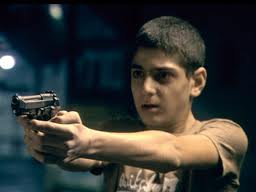 It is completely different what happens after this, depending on each viewpoint. Also, Malek and Omar have an incorrect idea regarding Binj being killed and who killed him, and this leads to tragedy.
It is completely different what happens after this, depending on each viewpoint. Also, Malek and Omar have an incorrect idea regarding Binj being killed and who killed him, and this leads to tragedy.
This movie depicts the suffering of Palestinians and their society, but since they are citizens living within the Israeli area, they have different problems than Palestinians living in the autonomous Palestinian district West Bank. I think this point is uniquely depicted in this movie.
I believe there are three things necessary to live happily as a human. One, a loving family; two, friends (social support); and three, a job (economic strength).
All the families that appear in this movie are full of love in their own way. They are not perfect, but each parent wants to protect their children at any cost and the children think cherishing their parents is most important. Even if this loving feeling is universal for humans, the family is a single unit for Arabs. When one person within one family commits a crime or makes a mistake, it becomes the crime of the whole family. In addition, the mother is strong and loving within her family, but because she doesn’t understand the society that has become dominated by males, she can’t handle serious matters so all difficult decisions fall to teenagers Malek and Omar as the “patriarch”.
Social support means friendships, community support, as well as the protection by the power of the government. The Palestinians living in Palestine territories like the West Bank district are surrounded by Palestinian brothers and can fall back on the country of Palestine that is able to protect them even if there is political instability. However, Palestinians living in Ajami cannot rely on Israel, the country they live in. The gangs, even though they are Arabs, target the lives of other Arabs. Because the Israel police don’t intervene in such disputes between Arabs, these people must find a solution within their own community, but this is not easy. Unless they have relatives and friends in Palestine’s West Bank district, escaping to there is not an option. These people with nothing in common except being called Palestinian are not friends. For Palestinians living in Ajami, the only support network is made up of their relatives and any friends made there.
Even if blessed with family and friends, you can’t survive with that alone. In order to survive, you need some occupation in order to eat. Even as an Arab, there are decent opportunities to get a higher education and a job in Israel. As an extreme example, Scandar Copti, a Christian Israel citizen of Palestine descent and one of the two directors of this movie, received a higher education and was able to become a popular movie director.
When this movie was nominated for the Academy Award for Best Foreign Language Film, director Scandar Copti said, stirring up controversy, “This movie represents Israel. I am an Israeli citizen, but I don’t speak for the Israeli government because I can’t speak for a government that doesn’t represent me. I am not a team member representing Israel.”
The Israel Cabinet Minister of Culture and Sport, Limor Livnat, said in response, “He wouldn’t have been able to make this movie without Israeli financing, much less walk the red carpet of the Academy Award ceremony. All the other people involved in making this movie think of themselves as Israeli citizens.” Also, Israel’s Legal Forum insisted, “If director Copti doesn’t withdraw his remark, this nomination should be withdrawn. Director Copti should have considered more carefully before receiving money from Israel.” Israeli director Menahem Golan also stated, “I wish director Copti had more respect towards investors. He should at least respect the people who worked with him.”
Director Copti doesn’t want to lose his identity as a minority in Israel, and perhaps he didn’t want an easy solution of “just being nice” for the conflict between Israelis and Arabs. However, I hope director Copti doesn’t forget about the opportunity he has been given as a new superstar in the movie world to improve the situation of Palestinians in Israel. I hope he will not be swayed by words like, “If you hate the people of Israel, don’t accept their money,” or, “Leave if you hate this country.” I hope he can say with an artist’s enthusiasm, “I will keep getting money and keep making better work; I will change history by making movies that can improve the Arab situation.” At least I think he is blessed with talent and opportunity to do so.

